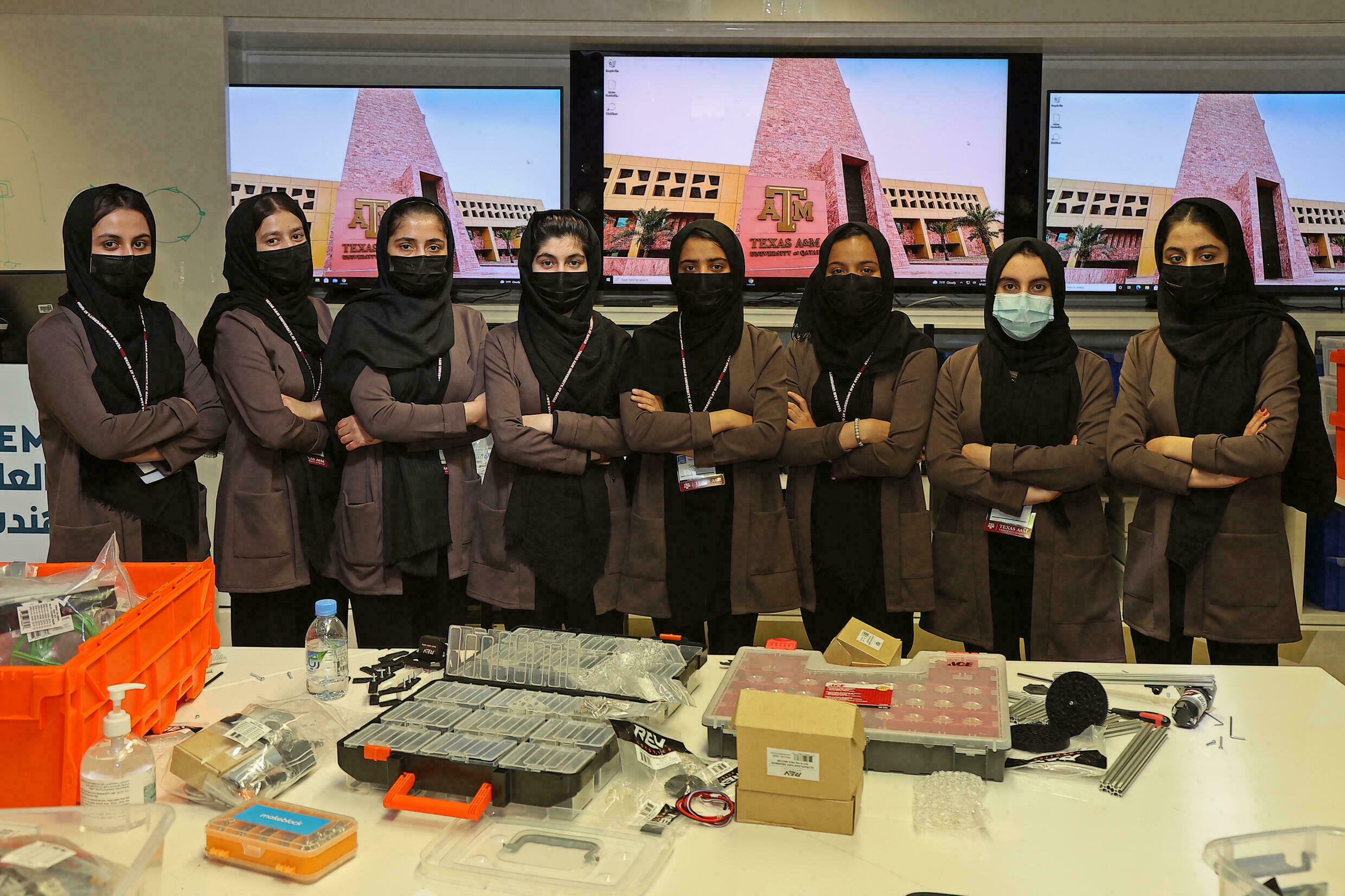Afghan Girls’ Robotics Team Continues Education And Training In Qatar
الحالمات .. فريق الروبوتات الأفغاني يشق طريقه بنجاح من قطر
forbes
Afghan Girls’ Robotics Team Continues Education And Training In Qatar After Fleeing Taliban Danger
Members of Afghanistan’s all-female robotics team, or “The Afghan Dreamers” have evacuated Afghanistan for Qatar, and are continuing their education and enriching their robotics skills through scholarships funded by Qatar Foundation and Qatar Fund for Development.
“It was very scary for everybody and we had such a big responsibility to make sure they’re secure,” Roya Mahboob, CEO of the Digital Citizen Fund, which is the parent organization of the robotics team said of the exit. DCF coordinated with Qatar’s government to obtain visas prior to the team’s departure.
Team member Ayda Hayderpoor said, “Nothing can be worse than leaving your loved ones behind. We were sad and cried and missed our families, but we are lucky to be safe and be able to continue our high school education at the Qatar Foundation’s Education City.” Hayderpoor, 17, and her teammates began attending their new classes this week.
Qatari officials organized for nine members of the Afghan Dreamers’ flight to Doha at the onset of the Taliban takeover. The faces and names of these nine have more prominently been featured in the media, putting them at greater risk of danger had they remained in Afghanistan, Mahboob said. The Dreamers began with a few girls in 2017 in Herat, and has grown to 50 members, boasts awards from global competitions and made it on Forbes 30 Under 30 Asia in 2021. They won an award at Europe’s largest robotics festival in 2017 for building a robot that uses solar energy for small-scale farms, and in 2020 with guidance from MIT constructed ventilators for Covid-19 patients at Afghanistan hospitals. The polarity between Taliban views and the political climate that these members are accustomed to is significant, and the new shift is predicted to further disrupt women’s opportunities. Under western control, in addition to other freedoms, 1.6 million more women entered the workforce in Afghanistan over the past 20 years, and in an attempt to continue the upward trend and ensure the safety of the Dreamers, Qatar’s aid is an early step toward advocating for a new generation of women.
The girls have resettled at Education City—a campus with multiple academic institutions—and will have opportunities to strengthen their skills at Qatar Foundation member universities including Carnegie Mellon and Texas A&M University, according to a September 7 press release. For Hayderpoor, focusing on the next competition is her priority, and attending “university in a field that we love and is top in technology,” is the next objective.
MORE FOR YOU
Spring Health Notches A $190 Million Series C At A $2 Billion Valuation, Making CEO April Koh The Youngest Woman To Run A Unicorn
How Journalist Errin Haines Is Documenting The Political Influence Of Black Women
Rebecca Allen Left A Career In Banking To Make The Perfect Nude Heel For Every Woman
Qatar and the DCF were proactive in finding refuge for the girls, and Mahboob cited wartime’s circumstantial conflict as a cause for concern. Taliban aside, chaos in the country could spur other factions that don’t favor female leaders to leverage the shift to ultra-conservatism and marginalize these girls, she explained. The escape was important because, “you might have a lot of people who support you, but you might also have a small group of people who don’t like what you’re doing and it might give them the opportunity to harm you.”
Shortly before Taliban resurgence and the republic’s collapse, the administration aimed to continue progress and draft new initiatives—one of them to increase women’s presence in technology with the robotics team in mind, according to former Deputy Minister of Women Affairs Hosna Jalil.
Jalil, who is also the former Deputy Minister of Interior Affairs and the first woman to hold a senior position in that ministry, extols the robotics team and views them as a paragon of progress and success. “What I have learned from these girls is, they won’t give up,” she said. “They start something and they don’t give up; they make it happen.” “I’m absolutely proud of these teenagers—their dedication, their passion, their determination—it keeps inspiring me.”
In 2019 President Ashraf Ghani approved a project to develop a larger institute for the Dreamers at Kabul University that would span six acres at $2 million per acre, according to Mahboob. Completion of the project now remains unseen. Mahboob sees her dedication toward young women not as a charitable activity, but as work that she should be doing for her country. “They are the young generation that is going to build Afghanistan 2.0.” Market size for robotics is expected to reach $499 billion by 2025, according to a 2021 Technology and Innovation Report by the UN Conference on Trade and Development, but enriching the girls’ lives is on Mahboob’s mind. Creating space for girls in tech has helped build their confidence and garner more respect in society, Mahboob said. “It changed their family members’ minds when the girls started to do mechanical stuff at the home—repair radio and trying to fix things—and their brothers or their fathers were so surprised, they like it.”
Director General of Qatar Fund for Development Khalifa bin Jassim Al Kuwari said the venture offers “high-quality technical training in the use of modern technologies that will enable Afghani female students to acquire the skills and knowledge that will allow them to be appropriately qualified and in demand within the labor market.”
Hayderpoor is hopeful for the future and stands by her rights. “If you are a male or female, still you are human and all the humans have their own rights,” she said. She asks that these rights, specifically the right to an education, be observed. “All the girls and women in Afghanistan deserve that.”
Dozens of other girls from the robotics club have remained in Afghanistan, choosing to continue their education there, if and when possible. Mahboob ensures that the girls will not be abandoned. “We will never give up on them.”
الشرق
الدوحة: اكتسب فريق الروبوتات الأفغاني النسائي المعروف باسم “الحالمات” مكانة مميّزة في قطر التي خرجن إليها بعدما تم إجلاؤهن من كابل في أعقاب سيطرة حركة طالبان على أفغانستان.
ووفق وكالة فرانس برس فقد عاد الفريق إلى التعلم والعمل على التحضير لمشاركاتهن في مسابقة عالمية للروبوتات، لكنه يشعر بالقلق بشأن بلده ويأمل في العودة يوما ما إليها .
وقالت عضو الفريق عايدة حيدربور (17 عاما) التي أحبت الهندسة الرقمية بفضل لعبة “سوبر ماريو” منذ أن كانت طفلة، إنه “كان من الصعب جدا” متابعة الأحداث في أفغانستان، ولكنها تأمل في العودة لفتح أول مدرسة في العلوم والتكنولوجيا والهندسة والرياضيات.
وأضافت مبتسمة “اعتاد جدي أن يسألني الكثير من الأسئلة حول جهازه اللوحي وهاتفه… الروبوتات جديدة في أفغانستان، خاصة بالنسبة للنساء”.
وبينما تحلم حيدربور بأن تعمل يوما ما لدى شركة “مايكروسوفت” العملاقة للتكنولوجيا، فإنّها تؤكد لوكالة فرانس برس أنّها تريد “العودة وخدمة شعبي”.
وفي مختبر الروبوتات في جامعة “تكساس إيه أند أم” في قطر، انحنت حيدربور على كمبيوتر محمول مزيّن بشارات ملوّنة بينما كانت زميلاتها يجمعن المكونات.
وقد تم وضع الفتيات اللواتي تم إجلاؤهن إلى قطر في ثلاث مؤسسات حسب احتياجاتهن وحصلن على منح دراسية كاملة.
وتجتمع الفتيات في قطر بعد الدوام المدرسي للعمل على مشاركاتهن في مسابقة “التحدي العالمي الأول” للروبوتات.
وعندما سُئلن عن المدرسة في قطر بعد مغادرتهن الصعبة من أفغانستان على متن طائرة عسكرية قطرية وبقائهن في الحجر الصحي لمدة 10 أيام وسط جائحة كوفيد، ردّت الفتيات بصوت واحد “كل شيء على ما يرام”.
وتبادلت مجموعة منهن نقاشا بدا حيويا حول مكون خاطئ في لوحة من المقرر استخدامها لقياس الطقس في الأيام المقبلة.. وقالت حيدربور “لم نتمكن من إصلاحه لأسبوع، لذا قمنا بتغيير السلك”، فيما كانت تقف قرب طاولة مختبر مليئة بالأدوات.
وبجانبها، قامت عضو أخرى في الفريق بتجميع الغلاف البلاستيكي لمحطة قياس الطقس بينما كانت تتفحص هاتفها بشكل منتظم. وعلى الجانب الآخر من الطاولة، عمل نصف الفريق على بناء روبوت قادر على التقاط الكرات البلاستيكية وإطلاقها بعيدًا.
وقالت قائدة الفريق سمية فاروقي (18 عاما) قبل أن تعمل مع زميلتها فلورانس على إصلاح محرك “أنا حزينة للغاية لأننا فقدنا عائلتنا ومدربينا وحياتنا” بمغادرة أفغانستان فجأة.
وساعدت رؤية محبوب، وهي مؤسسة شركة برمجيات أفغانية، في 2012 على تشكيل الفريق الذي تمكّن من تطوير جهاز تنفس منخفض التكلفة العام الماضي في ذروة انتشار وباء كورونا.
وتصدرت الفتيات عناوين الصحف في عام 2017 بعد رفض منحهن تأشيرات للمشاركة في مسابقة الروبوتات في واشنطن، قبل أن يتدخل الرئيس السابق دونالد ترامب ويسمح لهن بالسفر.
وفي العام ذاته، فازت الفتيات بجوائز مرموقة في مجال الروبوتات.
وقالت محبوب عن استيلاء طالبان على السلطة : “يجب ألا نغير توجّهنا”، مضيفة بهدوء أنّه “لا يوجد خيار حقيقي” سوى التواصل مع طالبان.. وتابعت “أولئك الذين أسموا أنفسهم حلفاء لنا يجب ألا يتخلوا عنا مرة أخرى”.
في الجزء الخلفي من الفصل الدراسي في قطر، نسخة مكتملة من آلة التقاط الكرات بناها فريق قطري في عام 2020 في ظل ظروف مختلفة تماما.
ووصف المشرف على المختبر في الجامعة بنجامين سيسلينسكي مهارات الفتيات بأنّها “على مستوى عال حقا” على الرغم من محنتهنّ.




